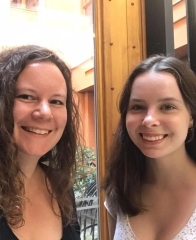 / The Case for Disagreement
Subscribe
/ The Case for Disagreement
Subscribe

United World Colleges (UWC) is a movement that brings together youth from all around the world, often from countries that are in conflict with each other, and provides opportunities for dialogue, cooperation and conflict resolution as they live, learn, and serve the community in which they are placed. Its mission is to make education a force to unite people, nations, and cultures for peace and a sustainable future. It is set in seventeen countries including India, Norway, Costa Rica, and Canada, and each school is attended by 200-300 students representing about eighty-five countries. Like many UWC students, I left my home country, Turkey, at the age of sixteen to join the movement. I was placed into UWC Atlantic, which is based in the United Kingdom. Upon arrival, surrounded only by dissimilar others in this foreign country, my cohort and I were faced with the universally daunting task of making friends at a new school. Our mother tongues, skin colors, life experiences, religious beliefs or lack thereof, and political alignments set us apart. Each of us had a different version of history built into the fabric of our identities as a source of pride, grief, and camaraderie. Finding that there was little we had in common, barring our dreams of becoming the building blocks for a peaceful future, we bonded over our differences. We discussed politics and religion until three o’clock in the morning. Over steaming cups of tea, we argued about what was right and what was wrong, as well as who was right and who was wrong. We disagreed, corrected and stood corrected. We learned.
While relationships and interactions are considered to be more open in the U.S. compared to many other countries, I found the American social convention of small talk in the early stages of a relationship stifling when I moved here for college. Having experienced how early interactions with dissimilar others could be like at UWC, I wanted to talk about politics, about ideas, about what made this stranger who he or she was—not about the weather. I understood the reasoning behind, but could not see the appeal of, the conversational waltz I was expected to perform in all my interactions, though I still worked on perfecting my steps (when in Rome, do as the Romans do). Engaging in small talk allows us to sidestep risky topics such as politics and avoid disagreements that may lead to the dissolution of fragile new relationships.
A well-known finding in social psychology research, similarity-attraction dictates that our liking for others depends on how similar to us we perceive them to be. Interacting with similar others is validating and reinforces our beliefs. Conversely, perceived dissimilarity decreases liking. Disagreement is risky and uncomfortable and we go great lengths to avoid encountering it. Take, for instance, the mass unfollowing and unfriending of people on social media in the months leading up to and following the 2016 U.S. Presidential election. The internet is filled with articles about how the election created a divide among loved ones and destroyed friendships. This tumultuous election season did not only illustrate our aversion to disagreement, but also reveals in some cases how little we know about the people close to us. Many of us felt shock, anger, and even betrayal when we became aware of our friends’ political views. I believe that our ignorance about one another’s positions on some of life’s most fundamental questions has a lot to do with the way we interact with each other. Small talk shields us not only from discomfort and disagreement, but also from getting to know one another on a deeper level.
In my senior year of college, still not sold on the concept of small talk, I set out to explore whether we could skip the small talk without harming new friendships. In other words, was it possible to risk discovering that we are dissimilar to a new acquaintance, disagree with her, and yet nevertheless preserve the acquaintance? In my honors thesis, “Simulating A Third Culture Kid (TCK) Experience to Enhance Friendship Prospects,” I explore just this question. TCKs are adults who have meaningfully interacted with one or more cultures other than their parents’ in their developmental years (0-18), most often because of their parents’ occupations. Previous research on TCKs shows that they skip the small talk and begin interactions at a higher level of intimacy, and are very successful in quickly establishing friendships in highly diverse new social environments. My findings indicate that exposure to respectful, positive discussions of high intimacy topics among new acquaintances mitigates the negative impact of the perceived social faux pas of skipping the small talk. Moreover, our success with skipping small talk hinges on how comfortable we are with the discomfort of disagreement and how open-minded we are accommodating dissimilarities.
The waltz of small talk plays an important role in protecting budding friendships in their initial stages. However, if we stick to non-intimate topics in our relationships and never breach risky topics, we not only set ourselves up for the kind of surprise and anger many felt with their friends during this election season, but we also inadvertently create a space for extreme ideas to grow. Shutting out people who hold beliefs that conflict what we believe eases discomfort, but at a cost that may be greater than just the loss of our relationships. Ideas we oppose do not cease to exist if we turn the other way. If we remain in the safety and comfort of affirmation, opposing ideas go unchallenged and, as a result, may instead become more extreme and dogmatic. Disagreement may be uncomfortable, but discomfort is a price we ought to be willing to pay for the chance to discover whether our beliefs stand up to scrutiny.
Meltem Ozcan received her BA in Psychology and Korean from Wellesley College in 2017. She is currently doing research on PTSD, traumatic stress and sleep deprivation at the Social, Cognitive, and Affective Neuroscience (SCAN) Lab at the University of Arizona.
Photo Credit: MJgraphics, "Business Communication or Negotiation Problems," via Shutterstock, 24 July 2017.





